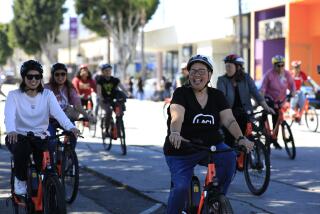HUNTINGTON BEACH : Couple May Possess World’s First Bike
- Share via
Bicycle shop owners Ralph and April Carnevale think a crumbly old relic that came into their possession almost by accident five years ago may be the world’s first bicycle.
The bicycle was made in 1862, and they believe it prompted the first bicycle patent in the United States in 1866 by French carriage maker and blacksmith Pierre Lallement.
The first model was built partly in France and partly in the United States, they said. It was later manufactured in Boston, Mass., by the Columbia Bicycle Co., which bought the patent from Lallement, she said.
The Carnevales plan to ship the old oak and iron vehicle to Boston in October for display at the International Cycle History Conference. They hope that curators and other experts consider it authentic and help their efforts to authenticate it.
April Carnevale said the bicycle is priceless, even though no dollar total has been put on it. Although she wouldn’t “turn down an astronomical offer,” she said, she holds out hope that it eventually will find a home in the Smithsonian Institution.
Ralph Carnevale, a bicycle shop owner in Huntington Beach for more than 20 years, said he happened across the bicycle in Pasadena when he helped a collector sort through her inventory after a divorce.
He said the bicycle looked a bit junky but appealed to him because it was crude and handmade, and he accepted it and another bike as payment for his work.
A couple of years went by, and his wife decided it was time to get rid of some of the old bicycles, he said. But first he asked her to see that nothing of value would be thrown out.
She found a sketch from the U.S. Patent Office in a 1974 edition of Wheelman Magazine showing that the bike bore “a striking resemblance” to Lallement’s invention, she said.
Matthew Beerer, 30, a bicycle racer who is helping the Carnevales in their quest for authenticity, said the Henry Ford Museum in Dearborn, Mich., may test it if experts think there is a good chance that it might be historic.
The process could cost up to $50,000 and would involve testing the iron that reinforces the oak frame to see if it matches the kind of iron that was used during the last century.
The old bike was missing its front wheel and pedals when Carnevale obtained it. He built the parts in the back of his shop, designing them to look as much as possible like the original equipment.
The Carnevales are keeping the bicycle in an undisclosed warehouse outside Orange County.
More to Read
Sign up for Essential California
The most important California stories and recommendations in your inbox every morning.
You may occasionally receive promotional content from the Los Angeles Times.













